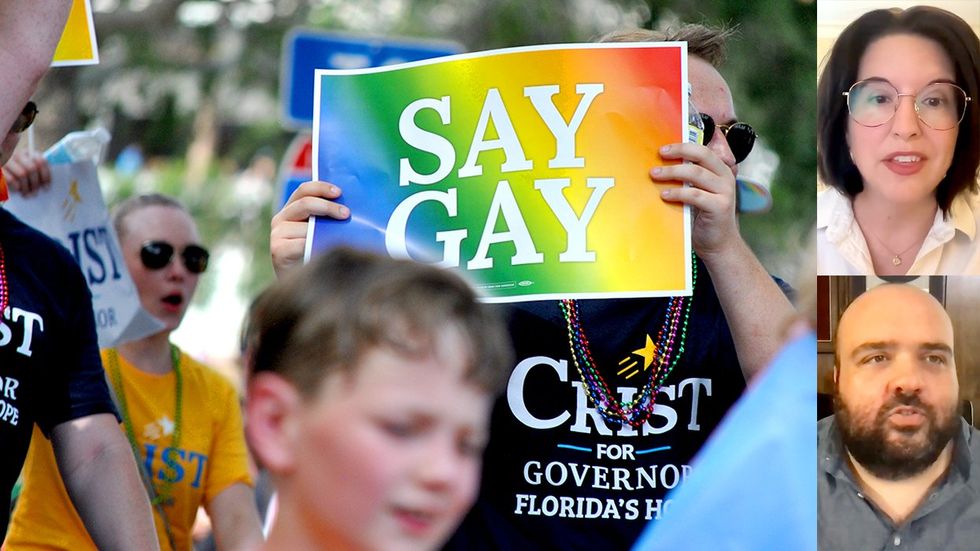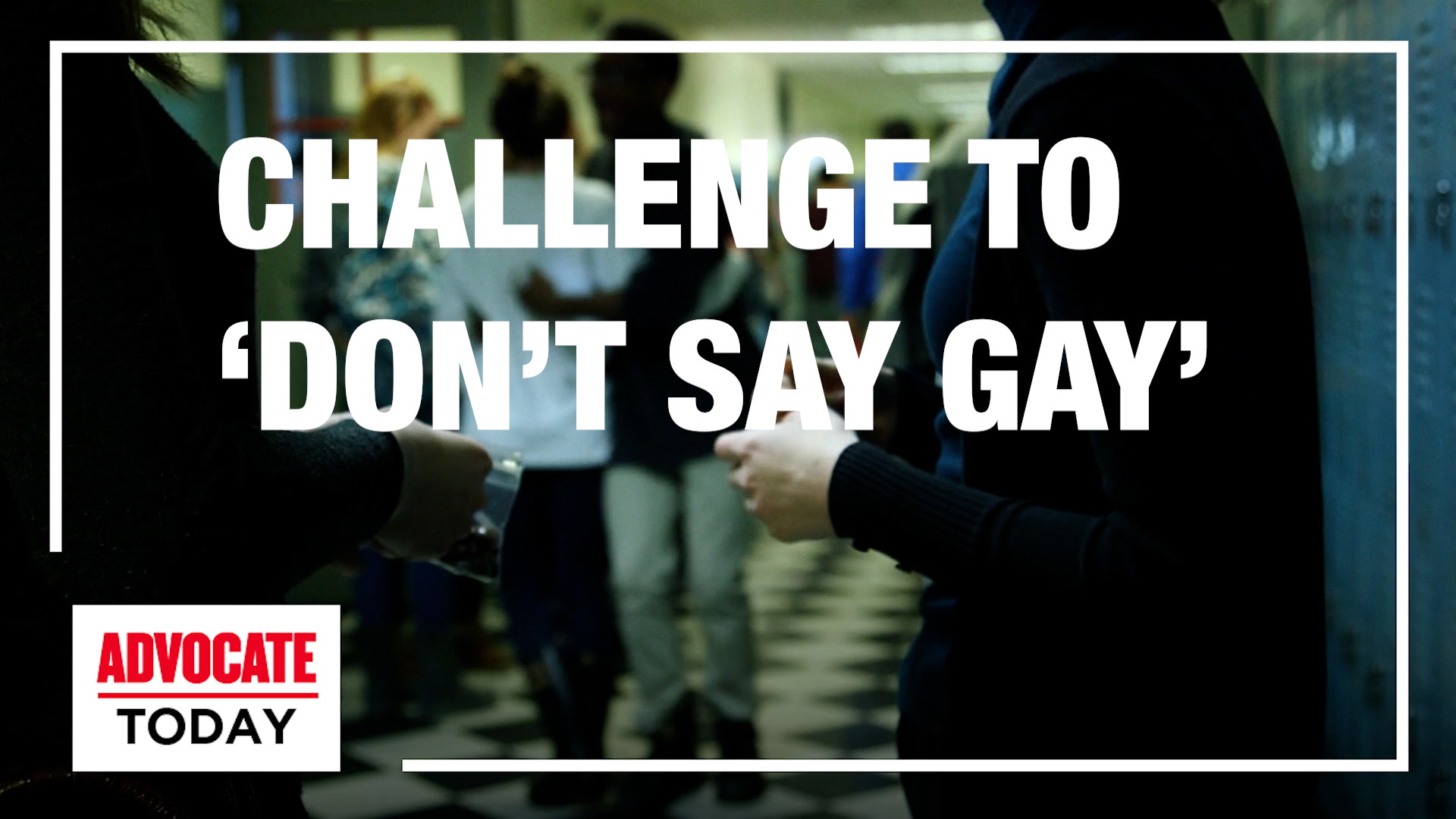It was a busy week in LGBTQ+ news, and two Advocate editors sat down for a conversation about the latest headlines on Advocate Today. Up for discussion: a settlement on the ‘don't say gay’ bill in Florida, and a new poll that found restrictions on trans and abortion rights are losing issues, even with swing voters.
Participating in this discussion are Alex Cooper, editor of Advocate.com, and Kayla Gagnet, executive director of digital content for equalpride. The conversation was moderated by Advocate Channel host LaPorsche. Watch the video below or read the transcript, which has been edited for clarity.
Stream Advocate Today on The Advocate Channel website or on your favorite streaming video device.
LaPorsche: Let's start with the don't say gay settlement. Alex, what can you tell us about this development?
Alex: So it was a huge victory for LGBTQ+ rights activists, who have been lobbying against the legislation since it was signed into 2022. I mean, it's pretty significant. You have this bill, the first of its kind in the U.S., this law that restricts discussion of gender identity and sexual orientation in schools, originally up until a third grade, and then with an expansion, up until 12th grade
and then any public institution, really.
So now what happened with the settlement is that they've clarified what the law actually means and what it actually restricts, which is not a lot. So through the settlement, you know, things like gay-straight alliances can be organized, safe space stickers can be used, the teachers can talk about their partners, programs against bullying can still go on.
And this came after this fear of this law restricting all of that. So it was this it was the vague definition of the law that caused educators and Florida school officials to literally be scared to do anything because part of the law is this ability for parents to sue if there is a violation.
So a lot of educators were concerned that they were going to be sued if they talked about same-sex partner, if they tried to do a safe space at their school, if they, you know, discuss anything about gender identity or sexual orientation at all. This settlement specifies that such discussions cannot be part of an official curriculum or an official instruction.
LaPorsche: This settlement is another victory for civil rights attorney Roberta Kaplan. What can you tell me about Roberta?
Alex: She's a champ. She is amazing. She has been on the forefront of many civil rights cases when it comes to plus people and others in the last several over a decade. She also she represented Windsor going against the Defense of Marriage Act, and she also represented E. Jean Carroll recently against Trump winning her tens of millions of dollars.
LaPorsche: What effect do you think this will have on similar laws in other states, Alex?
Alex: I mean, I think this is going to have a ripple effect of what these laws actually can do and what restrictions are in place. I mean, I think there's a little problem when there is such a law in place, right? There's still a restriction on that, on discussing queer experiences like if it was in the official instruction. But this settlement shows that the law isn't as expensive as many feared it would be or feared that it could be.
LaPorsche: Now, Kayla, I'm just curious, what are your thoughts on this law? What effect do you think the (settlement) has?
Kayla: I mean, I think the biggest thing that we can hope for here is that this is also a discouragement to the groups and the people that are pushing these kinds of laws, because they see that these kinds of challenges can have an impact. And we know that as LGBTQ rights have been under assault for the past couple of years and at the state level -- Florida is certainly leading the way in this effort. You know, to see Florida then get such a strong pushback and such a strong rebuke, really clarifying this – the hope is that we would then see that ripple through some of these other state legislatures that have really used a lot of Florida's legislation as a model in their states.
LaPorsche: Now, you covered this week a new poll commissioned by GLAAD. The LGBTQ+ advocacy group found that restrictions on trans rights and abortion rights are losing issues even among swing voters. I'm curious, Kayla, what specifically did the survey find about the voters’ view on anti-trans legislation?
Kayla: So we have a story about this on The Advocate this week from reporter Trudy Ring, and what it found is that queer voters are first of all, they're highly motivated to head to the polls. So, you know, broadly speaking, GLAAD is looking at what is the state of voting for queer people heading into the November election. And they found that 83% said they are definitely voting in November. And they also found that a full 60% of LGBTQ voters nationwide favor Biden over Trump, with an even greater number favoring him in swing states.
But, you know, queer voters, just like voters in general, want to see politicians address
other issues like the economy, abortion rights, climate change, these other topics. And I think that is really reflected in their view about politicians who push anti-trans legislation.
They had found that a majority of all voters, not just LGBTQ voters, oppose candidates who frequently speak about these issues of restricting the rights of trans kids to access health care or participate in youth sports. And 81% of them, which is such a huge majority, say that health care decisions for trans kids should be made by parents.
LaPorsche: If these policies are so unpopular, why do politicians continue to pursue them in so many states across the country?
Kayla: What we found is that in a lot of ways, this battle is similar to the abortion rights battle, in that these anti-trans advocates are really following a playbook that's similar to the anti-abortion playbook. They're well-funded conservative Christian groups, including the Alliance Defending Freedom and the Family Research Council that are behind this effort nationwide.
And often when you hear about a bill at the state level to restrict gender-affirming care, it originated with one of those conservative think tanks. They draft the legislation and then they help fight to get it passed. They'll bring in the same handful of witnesses to testify in favor of these bills all over the country.
LaPorsche: How does this political climate affect LGBTQ people especially?
Kayla: What GLAAD's poll found in this case is that this current political environment is really hurting queer people's mental health. A majority of them reported negative effects on their mental health and a majority also reported that they're fearing for their families and their own safety. And almost half of them report online harassment or bullying, both in the real world and online because of politics. So there's real impact here. Even when these laws don't pass, there's impact on queer people's mental health.
LaPorsche: You know, it's so interesting, because we we pride ourselves on being the leaders of the free world and a very progressive country. And yet year by year, we're going backwards. So, Alex, I'm asking you, how does this political climate affect LGBTQ people?
Alex: I hear what you're saying. It is harmful. And even today, The Washington Post came out with an analysis of FBI data that showed that hate crimes against LGBTQ students in schools have quadrupled over the years. And specifically, in those states that have anti-LGBTQ+ laws, too. So these are states where they're going after trans kids’ health care and passing those types of legislation.
LaPorsche: It’s just so sad, you know? So we're going to continue to hope that everyone shows up to the polls and do what needs to be done this election season. Kayla, Alex, thank you so much for joining me on Advocate Today.



















































































